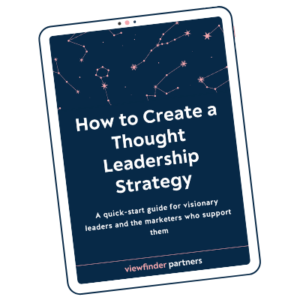Today marks FIVE YEARS since I left my last full-time job and started working as a thought leadership consultant.
The past 5 years have been a wild ride for many people—I made the leap into entrepreneurship just a few months before COVID swept into the world. And even though my life has changed a lot in the past 5 years, with plenty of my own rollercoaster moments, one thing has stayed steady: the absolute calm and peace I’ve felt about working for myself.
I recognize that working for yourself is not for everyone. But in a market that has swung wildly and a political climate that has been bonkers (I think that’s the technical term, right?), and as a parent to two young kids, working solo has been the best decision I could have made for these five wild years.
The business rules I follow
In the past 5 years, I’ve learned how to run a business that works for me. Reflecting on those lessons, I kept returning to a few key “rules” I apply to my work.
Feedback is a gift
Writers everywhere learn this rule by necessity early in their careers. If you write anything for anyone, you’re going to get feedback. Welcome it! Feedback is a gift that helps you reconsider and improve your work.
Now, I find myself teaching this truism to clients to convince them that it’s OK for them to share their honest reactions and revisions. I’d much rather get fast, specific feedback than beg a silent client to tell me anything so that we can move their project forward.
Feedback is a gift, and it helps us get better.
Wherever you are, be there
Years ago, I heard a CMO share this saying in a keynote. She had a big job running a large team, and she had a busy family life at home. Her answer for managing it all? “Wherever you are, be there.”
If she was leading a big meeting, she was fully present for the people in the room. If she was at home with her family eating dinner, she kept her attention on the people around the dinner table, not checking her email one more time.
In a culture of constant distractions, this simple rule is hard to apply. But because I want to do a lot of different things with my finite time every day, I try my best to be fully present during work hours so that I can be fully present for my other priorities later.
Slow Fridays
As a way to carve out time just for me, I started blocking Fridays on my calendar. As a rule, I don’t take client calls on Fridays. Often, I don’t do any work at all. Fridays are my low-stress day to run errands, read, relax, prep for the weekend, and breathe. This practice has done wonders for my mental health. Even in busy weeks, I know I can look forward to a slow Friday.
Never blame the kitchen
In college, I waited tables at a very fancy country club. As someone on the “front of house” side of the restaurant, I was in direct contact with our customers. But I didn’t develop the menu, cook the steaks, or stock the ice cream. There was a whole crew of funny, smart, experienced people in the “back of the house” (i.e., the kitchen) who did all of that invisible work behind the scenes.
I had an incredible manager, Rohan, who taught me a rule I still think about often: Never blame the kitchen.
A customer sends their steak back because it’s overcooked? Mrs. Edwards wants her broccoli even more well done? A kid on the patio throws a fit because their spaghetti didn’t come with butter? It would be easy to say, “Oh, I’m so sorry. The chef must have misread the ticket.” But not on Rohan’s watch. We were all on the same team. If something went wrong, I had to own that mistake. I could spread praise but never blame.
The result isn’t just a united team; it’s a humble way to run a business. Everyone owns the whole team’s work, and there’s never trash-talking or blaming. No excuses. We win together and lose together.
That lesson became deeply ingrained in me. Even though I don’t have employees now, I do bring together teams of pros to deliver client work. We’re all one team, and I never blame the kitchen. If something goes wrong, runs over schedule, or needs a major fix, there’s no one else to blame. I own the mistake and get it fixed. No finger-pointing, no excuses, just one united team focused on delivering great work.
What if it all works out?
If you’ve been on a video call with me, you’ve seen the poster that hangs in my office: What if it all works out?
This comforting mantra came to me in 2020, and I latched onto it to combat all the “What ifs” of that year. There are so many factors we can’t control, so all we can focus on is what we can.






